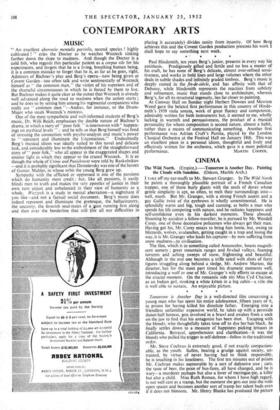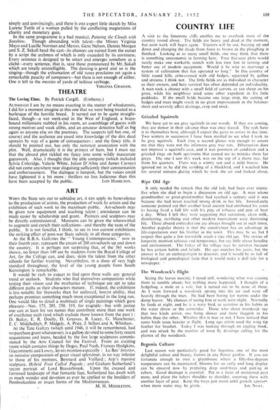CINEMA
The Wild North. (Empire.)—Tomorrow is Another Day. Painting the Clouds with Sunshine. (Odeon, Marble Arch.) I TAKE off my ear-muffs to Mr. Stewart Granger. In The Wild North he paints a thoroughly plausible portrait of a French Canadian trapper, one of those burly giants with the souls of doves whose gentle simplicity is apt, so often, to melt their surroundings into— well, mush. But Mr. Granger, with a strong French accent and a gay Gallic twist of the eyebrows is wholly unsentimental. He is splendidly warm and big, tough and cunning, as befits a man who spends his life competing with nature, and he radiates happiness and self-confidence even in his darkest moments. These abound. Shooting by accident a fellow-traveller, he is pursued by Mr. Wendell Corey, one of those decorative policemen who always get their man. Having got his, Mr. Corey essays to bring him home, but, owing to blizzards, wolves, avalanches, getting caught in a trap and losing the way, it is Mr. Granger who leads his capturer—by now suffering from snow madnesto civilisation.
The film, which is in something called Anscocolor, boasts magnifi- cent scenery ; great mountain ranges and fir-clad valleys, foaming torrents and aching sweeps of snow, frightening and beautiful. Although in the end one becomes a trifle sated with shots of furry figures struggling along behind a sledge, Mr. Andrew Marton, the director, has for the most part timed his dramatic moments well, introducing a wolf or one of Mr. Granger's wily efforts to escape at the crucial moment. On the romantic side sits Miss Cyd Charisse, as an Indian girl, stroking a white kitten in a log cabin—a role she is well able to sustain. An enjoyable picture.
Tomorrow is Another Day is a well-directed film concerning a young man who has spent his entire adolescence, fifteen years of it, in prison for having killed his dissolute father. Emerging into a friendless unfamiliar expensive world, he takes up with a peroxide dance-hall hostess, gets involved in a brawl and awakes from a sock on the jaw to find that his antagonist has been shot. Escaping with the blonds, who thoughtfully takes time off to dye her hair black, he finally settles down to a measure of happiness picking lettuces in California. Betrayal, apprehension and clarification—it was the blonds who pulled the trigger in self-defenee—follow in the traditional order.
Mr. Steve Cochran is extremely good, if not exactly companion- able, as the youth. Sullen, bearing a grudge against society, un- trained, by virtue of never having had to think responsibly, he is touching in his loneliness. The first ten minutes out of prison Mr. Cochran makes memorable by a sort of defensive awe ; cars, the taste of beer, the price of bus-fares, all have changed, and he is wary—a murderer perhaps but also a lover of meringue-pie, a killer but also a child. Miss Ruth Roman, for whom I have high regard, is not well cast as a tramp, but the moment she gets out into the wide open spaces and becomes another sort of tramp her talent buds even if it does not blossom. Mr. Henry Blanke has produced the picture simply and convincingly, and there is one expert little sketch by Miss Lurene Tuttle of a woman pulled by the conflicting magnetisms of charity and monetary gain.
In the same programme is a bad musical, Painting the Clouds with Sunshine. Though abounding with talent—the Misses Virginia Mayo and Lucille Norman and Messrs. Gene Nelson, Dennis Morgan and S. Z. Sakall head the cast—its chances are ruined from the outset by a script the archness of which is only exceeded by its corniness. Every sentence is designed to be smart and emerges somehow as a cliché—every sentence, that is, save those pronounced by Mr. Sakall which are totally unintelligible. The dancing is good and so is the singing—though the exhumation of old tunes proclaims yet again a remarkable paucity of composers—but there is not enough of either. One is left to the mercies of yards of tedious verbiage.
VIRGINIA GRAHAM.



































 Previous page
Previous page